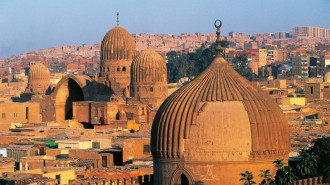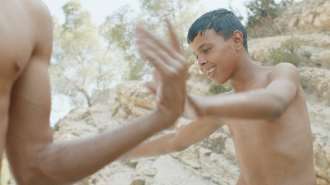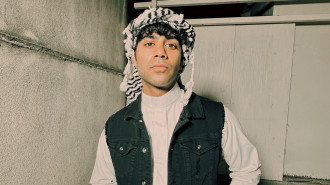Things You May Find Hidden In My Ear: Poems that paint the melancholy picture of Palestinian identity, memory and loss
“My family displacement has been a poem I’m trying to write, but because of occupation and exile, outside and inside, this poem is escaping and falling off the borders of my page,” Mosab Abu Toha tells The New Arab.
Mosab Abu Toha is a Palestinian poet from Gaza and his recently published poetry collection, Things You May Find Hidden in my Ear (City Lights Publishers, 2022), leads the reader on a turbulent journey of emotion that intensifies each time it is realised that without living certain experiences, understanding remains limited.
“When I think of family displacement, it often rises in the image of my late grandfather. He represents a lost Palestine for me; a Palestine that has been devastated by immigration, exile, and wars"
So does imagination, because how does one start to comprehend the trauma of living between the memory of an untarnished land and the brutalities of Israel’s colonial violence?
Abu Toha’s poetry reads like a passionate and urgent itinerary, but Gaza’s confines remain. The discrepancy between movement and colonial borders enforced by Israel is depicted throughout the collection, and it becomes evident that movement, in the Palestinian experience, is linked to the history of forced displacement.
“When I think of family displacement, it often rises in the image of my late grandfather. He represents a lost Palestine for me; a Palestine that has been devastated by immigration, exile, and wars.
"My grandfather dreamed of returning to Yaffa, the city of his birth and adulthood, however, he never achieved his dream. He passed away not only before I was born, but also before my father got married. The loss from my end is not only being unable to set foot in what used to be my grandfather’s home in Yaffa if it still exists but also being unable to see my grandfather and talk to him," Abu Toha tells The New Arab.
"I do not even know where his grave is. I cannot even travel to meet with my old aunt, who lives in Amman, Jordan, about four hours by car from Gaza. The occupation and the siege have turned these short distances into light-years.”
|
Abu Toha’s poetry reads like a series of gradual realisations or a restricted process in which Palestinians come to terms with their identity, memory and loss.
“I do not think one can fully realise their identity while still under occupation and siege. We can discover our national identity only when we are permitted to watch our country from the sea and air, not only on the ground. Still, not many of us can visit and see our country," he continues.
"It is nearly impossible for a Gazan to go to the West Bank, which is designated as Palestinian territory, not to say visit the 1948 cities like Yaffa, Haifa, and Jerusalem. We hear about these cities; we see them in videos and photos. We try extremely hard to solidify this identity despite all odds, by creating literature about our country, by reimagining it.”
|
Reimagining Palestine through narrations of oral history prevails, as Abu Toha explains. “As for memory, that of our grandparents and their stories of Palestine before 1948, it is perhaps the only thing we can keep intact. It is there in our minds and hearts. The oppressor cannot have access to it, not by using his F-16 or drones.
“Loss is not only about the death of our beloved ones. It is also about our lost childhood in refugee camps and displacement centres during every Israeli attack. The loss of a favourite bookshop or a street, our memory of them. My dream is to see these places not as I write about them in my poetry, but as I fail to imagine during and after the destructive cycle of wars,” Abu Toha ponders.
Indeed, Abu Toha’s poetry fluctuates between observations, reminisces and imagination. As the poet navigates his realm, it becomes even clearer that the Palestinian experience remains remote for those outside of it.
The concept of relevance for Palestinians is different from that of institutions and their bureaucracy, as is clearly portrayed by the poet in the poem, To My Visa Interviewer.
“Which one of me do you plan to interview? I am many, some I do not even know.”
Mahmoud Darwish, Ghassan Kanafani and Edward Said feature prominently in Abu Toha’s poetry. “Darwish represents the poetic, Kanafani the political and narrative, Said the critic and intellectual,” Abu Toha explains.
“Mahmoud Darwish was a child who left his childhood when he had left his home village, al-Birwa, in 1948 at the age of seven. That is true of me and my generation, who have to flee their homes during every Israeli attack. Moreover, every time a child hears an explosion or watches ruins and destruction, they find themselves compelled to leap into older age, leaving their innocence of childhood so they can handle suffering and death first-hand. Instead of being onlookers, they become actors on stage.
"As for memory, that of our grandparents and their stories of Palestine before 1948, it is perhaps the only thing we can keep intact. It is there in our minds and hearts. The oppressor cannot have access to it, not by using his F-16 or drones"
“Ghassan Kanafani embodied the committed Palestinian. He was involved in both the political and the literary scenes. Though he lived a short life, Kanafani produced several novels, short stories, essays, and analytic studies. He also was an official spokesperson of the Popular Front for the Liberation of Palestine (PFLP) as well as an editor of Al-Hadaf, the movement’s magazine, from 1969 until his assassination in 1972, at the age of 36.”
Of Edward Said, Abu Toha said, “Said’s education and his life later as a professor at Ivy League universities never diverted his attention from the Palestinian cause and his fellow Palestinians. He never hesitated to speak up on behalf of his silenced people, who were often discriminated against and criminalised when uttering the word Palestine. Said not only criticised Israel and the US administration, but also the Palestinian leadership around the time of signing of the Oslo Accords. He was a fearless critic of the wrongdoers, no matter who they are.
“The three of them held, and still hold, candles that light up our paths in every corner, inside and outside.”
What does it feel like to be writing about personal experiences of Zionist colonial violence, considering how mainstream narratives have normalised such violence?
Abu Toha describes the difficulties of such an achievement and endeavour. “It feels like pushing against a descending boulder while others around you are trying to break your legs. It is not easy to counter the narratives of the oppressors, especially when they have stronger means of amplifying their narratives. However, I think continuing to speak and write about the reality that we live in Palestine will win us justice when the oppressors are no longer able to speak when lies singe their throats and tongues when the unwavering waves of our voices break down the walls blocking their ears.”
"They do not hear our voices when we sing or tell a joke or scream when a hammer strikes one’s finger trying to hang a picture frame on the wall. They do not smell our blood, or the stench of our corpses left for days under the rubble because the Israelis shoot at any ambulance trying to advance and pick up the bodies"
The media also plays a role in dissociation. “It is like a plane, maybe a drone, which sees us in Gaza from afar, or as dots, or in black and white. They do not hear our voices when we sing or tell a joke or scream when a hammer strikes one’s finger trying to hang a picture frame on the wall. They do not smell our blood, or the stench of our corpses left for days under the rubble because the Israelis shoot at any ambulance trying to advance and pick up the bodies. That happened in the Shujaeeya neighbourhood in 2014, where the Israeli army bombarded the area indiscriminately, butchering dozens of innocent people, sometimes a whole family.
“My concern as a poet is how these people, including me and my family and neighbours, had felt and what there were doing before they lost their lives. What else had the shrapnel and bullets slaughtered? Their laughter that hid under their beds? The children’s schoolbooks? The telephone address book? What happened to the clock? Did time stop? Before or after they had died?” he adds.
“I walk carefully on the beach, look to/ see if a child’s footsteps lie ahead, /a child who’s lost a leg, or two, / or can no longer hear the waves.”
Abu Toha’s verses paint the imagery of the Palestinian reality that we need to see while acquainting us with the Palestinian thought process in terms of trauma inflicted by Israel’s colonial violence.
Ramona Wadi is an independent researcher, freelance journalist, book reviewer and blogger specialising in the struggle for memory in Chile and Palestine, colonial violence and the manipulation of international law.
Follow her on Twitter: @walzerscent







